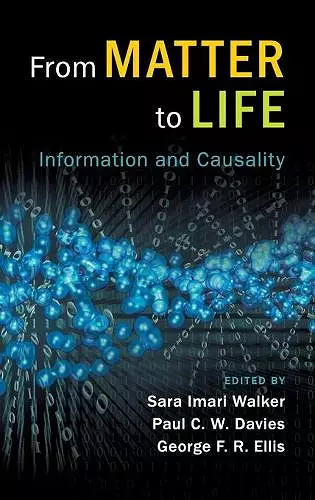From Matter to Life
Information and Causality
George F R Ellis editor Sara Imari Walker editor Paul C W Davies editor
Format:Hardback
Publisher:Cambridge University Press
Published:23rd Feb '17
Currently unavailable, and unfortunately no date known when it will be back

This book tackles the most difficult and profound open questions about life and its origins from an information-based perspective.
Recent advances suggest that the concept of information might hold the key to unravelling the mystery of life's origins. This book provides fresh insights from experts in philosophy, biology, chemistry, physics, and cognitive and social sciences to provide a unique cross-disciplinary perspective on the problem. It will be of interest to students and researchers in these fields.Recent advances suggest that the concept of information might hold the key to unravelling the mystery of life's nature and origin. Fresh insights from a broad and authoritative range of articulate and respected experts focus on the transition from matter to life, and hence reconcile the deep conceptual schism between the way we describe physical and biological systems. A unique cross-disciplinary perspective, drawing on expertise from philosophy, biology, chemistry, physics, and cognitive and social sciences, provides a new way to look at the deepest questions of our existence. This book addresses the role of information in life, and how it can make a difference to what we know about the world. Students, researchers, and all those interested in what life is and how it began will gain insights into the nature of life and its origins that touch on nearly every domain of science.
'From Matter to Life, by Walker, Davies and Ellis, is an astonishing, important book. What is information? Can information have causal consequences? If so, how? With new mathematics, wide and rigorous, this collection is a powerful springboard with which we can propel our science forward.' Stuart Kauffman FRSC, Mac Arthur Fellow
'The editors of From Matter to Life have complied a series of cross-disciplinary essays that focus on how the science of information can explain the function of living organisms. Contributions are made by noted biologists, chemists, and physicists who research the principles of chemical information. The book begins with the physics of life and other material that supports later findings about chemical principles of how molecular arrangements use an inherent system of information, which explains a broad array of living properties and organismic interactions. Many of the explanations are accompanied with detailed scientific accounts and mathematical formulas… most of the explained science requires some proficiency in chemistry, mathematics, and physics. The chapters are accompanied with ample primary references. This is an eclectic book that is appropriate for more advanced students and faculty, or for philosophy of science libraries.' B. R. Shmaefsky, CHOICE
'Each contribution is written by an expert on the field, in a scientific style and fully referenced to scientific publications … there is no definite or easy answer to the questions about information as a physical entity or its role in emergence of life from matter, but a number of interesting points are made about the nature of information and its role in physical reality. It is interesting to see the way in which the various disciplines, mainly physics, chemistry, biology, information theory and related fields, but also philosophy and cognitive and social sciences approach the issue. [This book is] a collection of scientific essays on new questions and what the various disciplines have to provide in the approach to give answers. … It is an interesting read for all those who want their thoughts provoked around the origin of life and what role information can possibly have in it.' Manuel Vogel, Contemporary Physics
ISBN: 9781107150539
Dimensions: 235mm x 158mm x 43mm
Weight: 880g
514 pages